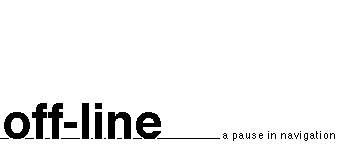Generally I am quite militant about privacy and personal
freedom. And I think they are also good for business. But in
the case of office e-mail it’s quite clear that a company has
a right to read, check and control all correspondence, by all
employees, sent or received on its behalf. On the other hand
employers should not be allowed to interfere with the
personal life of employees or intercept their private communication.
The solution is conceptually simple: separate identities.
It’s quite surprising that many companies (including some
that have fairly strict procedures about almost everything)
are ignoring this problem. I don’t think it’s because it
gives them a right to “spy” on people. They are
just being careless. Results, sometimes, are quite funny.
Personal messages come with elaborate tags dictated by a
corporate legal office; or with disclaimers such as
“this reflects only the personal opinion of
so-and-so“.
Using a corporate mailbox for personal mail is not like
calling home and saying “I’ll be late at the
office”. It’s like writing private correspondence on the
company’s letterhead. Therefore people (if they use the net
privately as well as for business) should have at least two
mailboxes. That helps, by the way, to keep mail files tidy.
People should also have a right (if they so choose) to use
encryption for private mail to which the employer doesn’t
have a key. Just as they have a private key to a drawer in
their desk.
Someone could argue that people shouldn’t be encouraged
to write too much personal mail from the office. But that’s a
separate story. If they have time to waste they could do
crossword puzzles or chat on the phone (or online). There are
some ridiculous ideas around, such as the German tax
authorities demanding that time spent online during work
hours (or anyhow on company owned systems) be treated (and
taxed) as compensation – while of course that’s impossible
to measure, or even to estimate reasonably. Bureaucracy is not
the answer. But separation of identities can help.
Even management should not use office mailboxes
(“letterhead”) for private correspondence. And, on
the other hand, senior people should be able to use protected
systems in order to discuss confidential matters in a
restricted environment. That’s not very easy, but
“secure systems” exist and they should be used when
appropriate.
It’s surprising how lackadaisical many people are about
confidential matters. Taxi drivers and restaurant waiters
probably know more corporate (and personal) secrets than most
professional spies. E-mail, of course, travels openly on the
net. And many confidential files are kept on networked
computers with such poor protection that it doesn’t take a
“great hacker” to read them.
Of course many companies can’t afford to manage their own
server with their own security. But they should be more
careful about how their systems are “hosted”. With
all the hype about e-business. and the lack of expertise in
most organizations, “outsourcing” can be a
reasonable concept; but too many companies fall into the trap
of suppliers (or software vendors) who say “don’t worry,
I’ll do it all for you”. It doesn’t work; and the
company’s identity, trading standards, reliability,
responsibilities and relationships (as well as information
that shouldn’t be revealed too soon to competitors)
are in the hands of someone else. Is that a trusted and committed
partner or some generic, standardized and leaky pipeline?
Security isn’t the only problem. Companies can lose
control of operations and allow outsiders to warp their identities.
The internet is no short-term fad. It’s here to stay.
Companies (and people) should lean to be in better control of
their communication. Distinct mailboxes won’t solve all of
the problems, but they are a good starting point. If we know
where and how things are happening, it’s easier to know where
to set the partitions. And it isn’t expensive. Anyone drawing
a decent salary can afford a personal internet connection
(even were “free” online services are not
available). Or, even better... it’s a small cost for a
company to give a personal mailbox to all its employees
– and encourage them to use it.
The more familiar they become with the internet at home,
the more efficient they will be when they use it for business.



